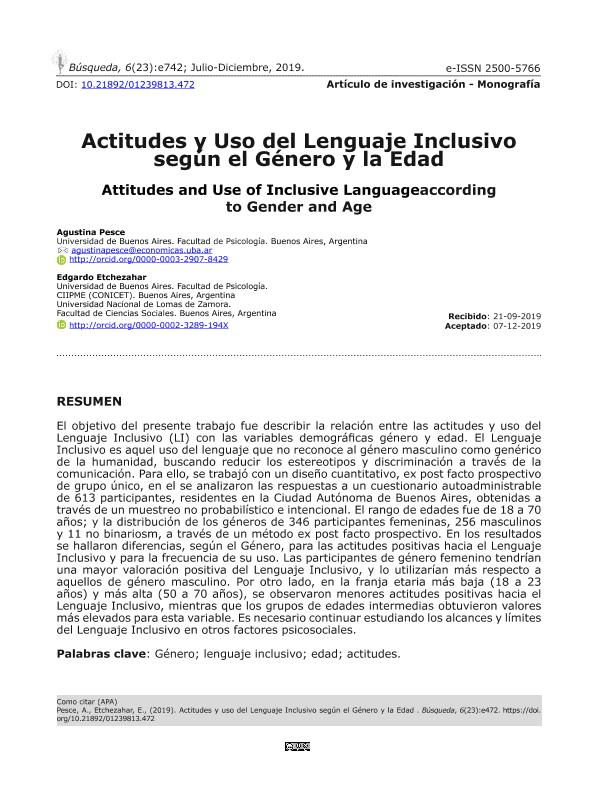Mostrar el registro sencillo del ítem
dc.contributor.author
Pesce, Agustina

dc.contributor.author
Etchezahar, Edgardo Daniel

dc.date.available
2020-07-23T19:59:44Z
dc.date.issued
2019-12
dc.identifier.citation
Pesce, Agustina; Etchezahar, Edgardo Daniel; Actitudes y uso del lenguaje inclusivo según el género y la edad; Corporación Universitaria del Caribe; Búsqueda; 6; 23; 12-2019
dc.identifier.issn
2500-5766
dc.identifier.uri
http://hdl.handle.net/11336/110111
dc.description.abstract
El objetivo del presente trabajo fue describir la relación entre las actitudes y uso del Lenguaje Inclusivo (LI) con las variables demográficas género y edad. El Lenguaje Inclusivo es aquel uso del lenguaje que no reconoce al género masculino como genérico de la humanidad, buscando reducir los estereotipos y discriminación a través de la comunicación. Para ello, se trabajó con un diseño cuantitativo, ex post facto prospectivo de grupo único, en el se analizaron las respuestas a un cuestionario autoadministrable de 613 participantes, residentes en la Ciudad Autónoma de Buenos Aires, obtenidas a través de un muestreo no probabilístico e intencional. El rango de edades fue de 18 a 70 años; y la distribución de los géneros de 346 participantes femeninas, 256 masculinos y 11 no binariosm, a través de un método ex post facto prospectivo. En los resultados se hallaron diferencias, según el Género, para las actitudes positivas hacia el Lenguaje Inclusivo y para la frecuencia de su uso. Las participantes de género femenino tendrían una mayor valoración positiva del Lenguaje Inclusivo, y lo utilizarían más respecto a aquellos de género masculino. Por otro lado, en la franja etaria más baja (18 a 23 años) y más alta (50 a 70 años), se observaron menores actitudes positivas hacia el Lenguaje Inclusivo, mientras que los grupos de edades intermedias obtuvieron valores más elevados para esta variable. Es necesario continuar estudiando los alcances y límites del Lenguaje Inclusivo en otros factores psicosociales.
dc.description.abstract
The objective of this paper was to describe the relationship between attitudes and use of Inclusive Language (LI) with the demographic variables Gender and Age. Inclusive Language is that use of language that does not recognize the male gender as a generic of humanity, seeking to reduce stereotypes and discrimination through communication. For this, we work whit a cuantitative research design ex post facto and prospective research whit one group design and the responses to a self-administered questionnaire of 613 participants, residents of the city of Buenos Aires, obtained through a nonprobabilistic and intentional sampling were analyzed. The age range was 18 to 70 years; and gender distribution of 346 female, 256 male and 11 non-binary participants, through a prospective ex post facto method. In the results, differences were found, according to gender, for positive attitudes towards Inclusive Language and for the frequency of its use. Female participants would have a higher positive assessment of Inclusive Language, and would use it more than those of male gender. On the other hand, in the lowest age range (18 to 23 years old) and highest (50 to 70 years old), lower positive attitudes towards Inclusive Language were observed, while the intermediate age groups obtained higher values for this variable. It is necessary to continue studying the scope and limits of Inclusive Language in other psychosocial factors.
dc.format
application/pdf
dc.language.iso
spa
dc.publisher
Corporación Universitaria del Caribe
dc.rights
info:eu-repo/semantics/openAccess
dc.rights.uri
https://creativecommons.org/licenses/by-sa/2.5/ar/
dc.subject
Género
dc.subject
Lenguaje inclusivo
dc.subject
Actitudes
dc.subject
Edad
dc.subject.classification
Psicología

dc.subject.classification
Psicología

dc.subject.classification
CIENCIAS SOCIALES

dc.title
Actitudes y uso del lenguaje inclusivo según el género y la edad
dc.title
Attitudes and use of inclusive languageaccording to gender and age
dc.type
info:eu-repo/semantics/article
dc.type
info:ar-repo/semantics/artículo
dc.type
info:eu-repo/semantics/publishedVersion
dc.date.updated
2020-07-01T17:03:59Z
dc.identifier.eissn
0123-9813
dc.journal.volume
6
dc.journal.number
23
dc.journal.pais
Colombia

dc.journal.ciudad
Sucre
dc.description.fil
Fil: Pesce, Agustina. Universidad de Buenos Aires; Argentina
dc.description.fil
Fil: Etchezahar, Edgardo Daniel. Consejo Nacional de Investigaciones Científicas y Técnicas. Oficina de Coordinación Administrativa Saavedra 15. Centro Interdisciplinario de Investigaciones en Psicología Matemática y Experimental Dr. Horacio J. A. Rimoldi; Argentina
dc.journal.title
Búsqueda
dc.relation.alternativeid
info:eu-repo/semantics/altIdentifier/doi/http://dx.doi.org/10.21892/01239813.472
dc.relation.alternativeid
info:eu-repo/semantics/altIdentifier/url/https://revistas.cecar.edu.co/index.php/Busqueda/article/view/e472
Archivos asociados
